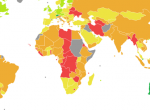
It has just released the 2013 annual report elaborated by Economic Freedom of the World produced by the Fraser Institute, a Canadian think tank, in cooperation with the Economic Freedom Network, a group of independent research and educational institutes spread over nearly 90 nations and territories worldwide. It gives 2011 data from 151 countries. According to this index the average global economic freedom score rose slightly to 6.87 out of 10 compared to 6.74 the previous year. This is interesting. Quantification and ranking are quite central in our culture, and measurement of economic freedom is not an exception.
Wondering about the ethical significance of economic freedom indexes leads us, first of all, to consider the concept of economic freedom used as to construct this index. According to Economic Freedom of the World the cornerstones for economic freedom are these: personal choice, voluntary exchange, freedom to compete, and security of privately-owned property. This is very much aligned with the definition of economic freedom in laissez-faire capitalism. More nuanced is the definition of economic freedom underlying the alternative Index of Economic Freedom, created by the Heritage Foundation and the Wall Street Journal: “Economic freedom is the fundamental right of every human to control his or her own labor and property. In an economically free society, individuals are free to work, produce, consume, and invest in any way they please, with that freedom both protected by the state and unconstrained by the state. In economically free societies, governments allow labor, capital and goods to move freely, and refrain from coercion or constraint of liberty beyond the extent necessary to protect and maintain liberty itself.”
- A first consideration is that respect for freedom is good, since freedom is an essential human development. In addition, economic freedom can contribute to the common good, since economic freedom tends to contribute to wealth creation to a greater extent than does economic restraint. The report cited emphasizes that there is a high correlation between countries with high economic freedom and those with above average per-capita GDP. Specifically, it says that nations in the top quartile of economic freedom had an average per-capita GDP of US$36,446 in 2011, compared to US$4,382 for nations in the bottom quartile in 2011.
- A second elemental remark is that economic freedom is only an aspect of human freedom. Some countries could enjoy economic freedom while other significant aspects of human freedom are not sufficiently respected. These indexes do not provide any additional information which can allow us to contextualized economic freedom.
- However -and this is my third consideration-, people could abuse of their freedom against others. In these indexes lack information regarding abuse or lack of responsibility in exercising economic freedom. Growth of GDP could be compatible with unfair working conditions or with a lack of respect for the environment.
- Related to the previous consideration in that indexes on economic freedom take lack of regulations as a positive factor of economic freedom. In contrast, from the ethical perspective, regulations are not necessarily bad. Regulations are acceptable and even necessary if reasonably prevent abuse of freedom –this is not the case of regulations that unnecessary limit economic freedom.
My conclusion is that such indexes should be more critical and combined the current data with further information about the responsible use of economic freedom.
Esta entrada también está disponible en: Spanish


I wish to point out my respect for your kind-heartedness supporting individuals who really want guidance on this particular field. Your real commitment to getting the solution throughout has been amazingly valuable and have empowered many people like me to arrive at their dreams. This interesting facts signifies this much a person like me and additionally to my office colleagues. Warm regards; from all of us.